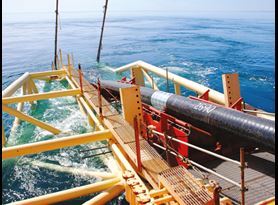Element's thermal conductivity testing and measurement services for Aerospace, Oil & Gas, and Transportation deliver precise and reliable results, tailored to you. With cutting-edge technology and global recognition, we help you achieve optimal performance and regulatory compliance for your products. Quick turnaround, expert support and non-destructive methods to test if your materials transfer or withstand heat in the most challenging conditions.
What is a Thermal Conductivity Test and Why Do You Need One?
Thermal conductivity refers to the speed and amount of heat transferred through a material at a given temperature. Accurately measuring this and understanding how materials will react to different heats and during different situations is essential for being confident that your product is fit for purpose in the most extreme conditions, often found in the Aerospace, Oil and Gas and Transportation industries. .
Testing and measurement provide the data to manage what materials are effective, and what operating methods compatible, to use at specific temperatures in diverse applications, whether the material is tasked with insulating, conducting heat, or enduring temperature fluctuations.
Key Benefits of Thermal Conductivity Testing Services with Element
- Precision Data: Acquire precise thermal conductivity data to accurately predict how your materials will perform in terms of heat transfer -ensuring your products are designed to meet performance requirements and regulatory standards.
- Ensure Regulatory Compliance: Many industries have strict regulatory requirements regarding thermal performance. Thermal conductivity testing helps you demonstrate compliance with these standards, ensuring legal compliance and market acceptance.
- Safeguard and Minimize Risk: In industries like Aerospace and Oil and Gas, temperature control is critical, so, understanding thermal conductivity helps ensure safety. Accurate thermal management prevents overheating and minimizes the risk of equipment failure or accidents.
- Accelerate Turnaround Time: A quick turnaround time is essential in many industries, particularly in testing and quality assurance. Equipped with high-capacity labs and advanced technical capabilities, Element ensures prompt delivery of testing results, helping you meet tight deadlines and avoid production delays.
- Non-Destructive Test Methods: Testing materials to ensure they can withstand harsh environments and conditions without causing damage is a delicate balance. Element offers non-destructive testing methods like Laser Flash Diffusivity and Axial Flow. These techniques provide valuable information about a material's thermal properties without causing significant damage, allowing for rigorous testing without compromising the integrity of the material.
- Access Expert Technical Support: You may require assistance in understanding and interpreting test results or optimizing materials for specific thermal conductivity requirements. Our technical experts provide crucial support to address your needs and concerns effectively. Element offers custom testing programs tailored to your unique requirements and specifications. Whether it's unconventional test conditions or specific material properties, our Engaged Experts work closely with clients to develop customized testing solutions that address their individual needs effectively.
Paints and Coatings Failures: A Guidebook on Causes and Remedies
Failure analysis is a valuable tool when investigating the root causes of asset failure, and developing a corrective action plan to ensure your paints and coatings adhere and remain intact.
READ MOREFailure Analysis of Pipeline Coatings
This free white paper includes an extensive case study of the failure analysis of a 12-inch diameter Fusion Bonded Epoxy (FBE) coated steel pipe that showed blistering of the coating and corrosion on the surface.
Read MoreStandard Update: Norsok M 501 edition 7
One of the most important standards for coatings testing in the oil and gas industry has undergone a major revision. This article explains the consequences for manufacturers and testing requirements.
Read MoreAccuracy and Reliability in Thermal Conductivity Testing and Measurement
Customers often face concerns regarding the accuracy and reliability of thermal conductivity testing results, which are crucial for making informed decisions about their materials or products. Element tackles this by employing rigorous testing methodologies and quality control measures to ensure the highest level of accuracy and reliability in our testing processes. Our state-of-the-art equipment and experienced technicians adhere to industry best practices and standards, guaranteeing precise and consistent results. Additionally, we regularly undergo accreditation and proficiency testing to uphold the quality and reliability of our testing services. With Element, you can have assurance in the accuracy of our thermal conductivity measurements, enabling you to make confident decisions.
Compliance to Internationally Recognized Standards
Thermal Conductivity Testing Methods and Equipment:
- Laser Flash Diffusivity (LFD): Compliant with ASTM E1461 standards, ensuring precise thermal diffusivity measurements.
- Axial Flow: Evaluates thermal conductivity via axial heat flow, offering valuable insights into material performance.
- Absolute Axial Heat Flow: Provides accurate thermal conductivity measurements across different conditions, suitable for testing materials with low to high conductivity.
- Comparative Cut Bar: Enables comparative analysis of thermal conductivity among different materials or samples, facilitating informed decision-making.
- The Probe: Utilizes advanced probing techniques to analyze thermal conductivity properties across various materials and environments.
- Naztech heat flow meter (HFM): Used to characterize material thermal conductivity and “R”-value. The HFM creates a thermal gradient across a sample, measuring the amount of heat
flowing in and out of the material. The Fourier equation is then used to calculate the thermal conductivity of the sample.
Why Choose Element?
Partnering with Element means you gain access to a comprehensive suite of thermal conductivity testing services, all under one roof. Our ISO 17025 accredited laboratory is equipped with state-of-the-art instrumentation, allowing us to accurately measure thermal conductivity and assess changes in thermal properties over time, temperature variations and fluid absorption.
We test to a wide range of international standards, including ASTM C518 and ISO 8301, ensuring that your products meet regulatory compliance requirements. If you have unique samples or unconventional test requirements, Element's Engaged Experts can develop customized testing programs to address your specific needs, ensuring comprehensive evaluation and accurate results. Our ability to provide thermal testing, measurement, and R-Value services, all in accordance with these standards, sets us apart as a leader in the field.
Element's global recognition is further underscored by our presence across key locations worldwide, including the UK, USA, Europe, and Asia. This global network provides you with easy access to reputable testing facilities staffed by knowledgeable experts. Visit our About Us page for more information and contact us today to start your thermal conductivity testing journey.
Related Services

Thermal Analysis Services
Element provides thermal analysis methods for determining important material characteristics, including DSC, TMA, DMA, and more.

Scanning Electron Microscopy (SEM)
SEM analysis is a powerful analytical tool which uses a focused beam of electrons to produce intricate, high magnification images of a sample’s surface topography.

Coatings Testing
Find out about Elements range of coatings testing services designed to help to make certain that materials, products and pipelines we test for our customers are protected from corrosion, ultraviolet light, water penetration, heat, abrasion and chemicals.

Oil & Gas
Element's global platform of laboratories offers advanced services designed to test and qualify materials intended for use within the environments of the future.

